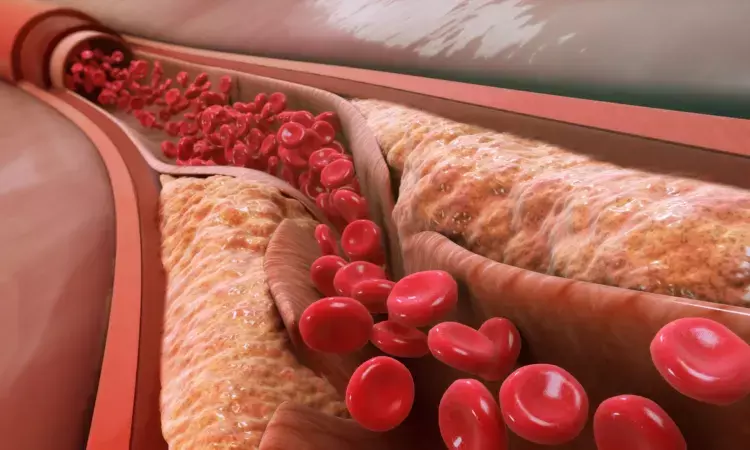- Home
- Medical news & Guidelines
- Anesthesiology
- Cardiology and CTVS
- Critical Care
- Dentistry
- Dermatology
- Diabetes and Endocrinology
- ENT
- Gastroenterology
- Medicine
- Nephrology
- Neurology
- Obstretics-Gynaecology
- Oncology
- Ophthalmology
- Orthopaedics
- Pediatrics-Neonatology
- Psychiatry
- Pulmonology
- Radiology
- Surgery
- Urology
- Laboratory Medicine
- Diet
- Nursing
- Paramedical
- Physiotherapy
- Health news
- Fact Check
- Bone Health Fact Check
- Brain Health Fact Check
- Cancer Related Fact Check
- Child Care Fact Check
- Dental and oral health fact check
- Diabetes and metabolic health fact check
- Diet and Nutrition Fact Check
- Eye and ENT Care Fact Check
- Fitness fact check
- Gut health fact check
- Heart health fact check
- Kidney health fact check
- Medical education fact check
- Men's health fact check
- Respiratory fact check
- Skin and hair care fact check
- Vaccine and Immunization fact check
- Women's health fact check
- AYUSH
- State News
- Andaman and Nicobar Islands
- Andhra Pradesh
- Arunachal Pradesh
- Assam
- Bihar
- Chandigarh
- Chattisgarh
- Dadra and Nagar Haveli
- Daman and Diu
- Delhi
- Goa
- Gujarat
- Haryana
- Himachal Pradesh
- Jammu & Kashmir
- Jharkhand
- Karnataka
- Kerala
- Ladakh
- Lakshadweep
- Madhya Pradesh
- Maharashtra
- Manipur
- Meghalaya
- Mizoram
- Nagaland
- Odisha
- Puducherry
- Punjab
- Rajasthan
- Sikkim
- Tamil Nadu
- Telangana
- Tripura
- Uttar Pradesh
- Uttrakhand
- West Bengal
- Medical Education
- Industry
Genetic Variations in LDL-C Levels Linked to Type 2 Diabetes Risk: Study Reveals

USA: A recent cohort study, published in JAMA Cardiology has explored the genetic link between low-density lipoprotein cholesterol (LDL-C) and the risk of developing type 2 diabetes (T2D), revealing an intriguing connection. The findings suggest that genetic mechanisms that increase LDL-C levels are inversely associated with the risk of type 2 diabetes. Higher LDL-C levels were linked to a reduced risk of developing T2D.
"Individuals with very low LDL-C polygenic risk scores experienced a 1.26-fold increased risk of T2D, while those with familial hypercholesterolemia, a condition characterized by very high LDL-C levels, showed the lowest risk for T2D (HR 0.65)," the researchers reported.
Treatment aimed at lowering high levels of low-density lipoprotein cholesterol has been shown to reduce the risk of coronary artery disease (CAD). However, it may also modestly increase the risk of developing type 2 diabetes. However, the relationship between genetic factors influencing LDL-C levels and the risk of incident T2D remains unclear. Therefore, Akshaya Ravi, Cardiovascular Disease Initiative, Broad Institute of MIT, and Harvard, Cambridge, Massachusetts, and colleagues aimed to explore how genetic predisposition to higher LDL-C levels may impact the risk of developing T2D.
For this purpose, the researchers analyzed data from the UK Biobank, including participants who underwent whole-exome sequencing and genome-wide genotyping. They categorized individuals into seven groups based on familial hypercholesterolemia (FH), predicted loss of function (pLOF) in APOB or PCSK9 variants, and LDL-C polygenic risk score (PRS) quintiles. Data was collected from 2006 to 2010, with a median follow-up of 13.7 years. The study focused on the association between LDL-C levels and the risk of incident T2D and CAD, using statistical models adjusted for key factors.
The following were the key findings of the study:
- The study involved 361,082 participants with an average age of 56.8 years, and 53.9% were female. The mean baseline LDL-C level was 138.0 mg/dL.
- During the follow-up period, 6.3% developed incident type 2 diabetes (T2D), and 5.0% developed incident coronary artery disease (CAD).
- The hazard ratio for T2D was lowest in the familial hypercholesterolemia (FH) group at 0.65, while the highest risk was observed in the predicted loss of function (pLOF) group at 1.48.
- The risk of incident T2D increased with lower LDL-C PRS, with the highest risk in the very low LDL-C PRS group (1.26), and the lowest in the very high LDL-C PRS group (0.72).
- The risk of CAD increased directly with the LDL-C PRS.
"Our cohort study found an inverse relationship between LDL-C levels and T2D risk across various genetic mechanisms influencing LDL-C variation. Further research is needed to better understand the mechanisms linking low LDL-C levels with an increased risk of T2D," the researchers concluded.
Reference:
Ravi A, Koyama S, Cho SMJ, et al. Genetic Predisposition to Low-Density Lipoprotein Cholesterol and Incident Type 2 Diabetes. JAMA Cardiol. Published online January 15, 2025. doi:10.1001/jamacardio.2024.5072
Dr Kamal Kant Kohli-MBBS, DTCD- a chest specialist with more than 30 years of practice and a flair for writing clinical articles, Dr Kamal Kant Kohli joined Medical Dialogues as a Chief Editor of Medical News. Besides writing articles, as an editor, he proofreads and verifies all the medical content published on Medical Dialogues including those coming from journals, studies,medical conferences,guidelines etc. Email: drkohli@medicaldialogues.in. Contact no. 011-43720751


